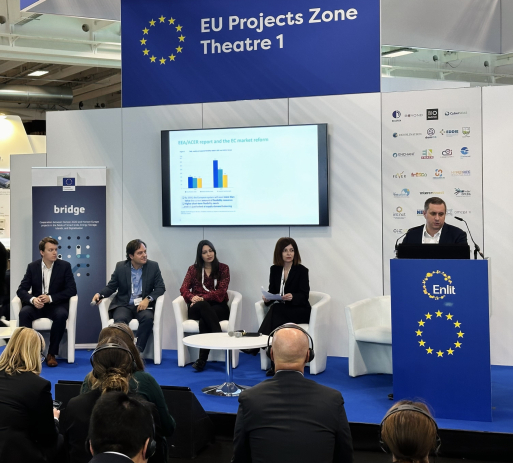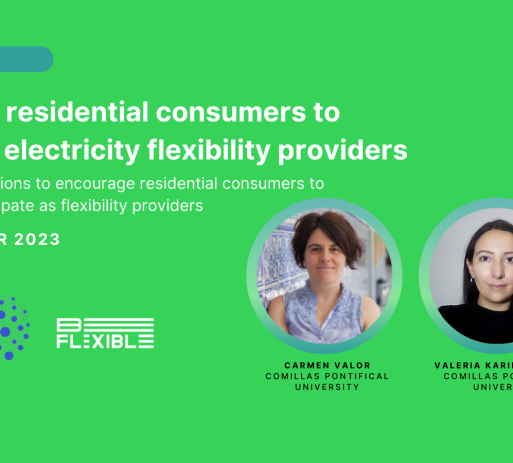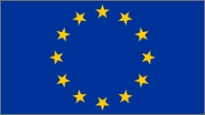The BRIDGE General Assembly 2023: Advancing Towards a Sustainable Energy System
Highlights and Key Discussions from the Three-Day Conference
The annual Bridge General Assembly, held in Brussels and virtually from March 28-30, 2023, brought together a diverse group of stakeholders, including researchers, industry representatives and policymakers. With a total of 93 projects and 53 running, the Bridge Initiative is steadily growing and will soon reach 150 projects. The assembly provided a platform for discussing the latest developments in the energy landscape and creating a sustainable, secure, affordable, and efficient energy system.
BeFlexible project participated as part of the Bridge Initiative, onsite represented by the University of Comillas (Regulation Working Group) and Zabala Innovation (Dissemination and Communication), and online participation in each of the working groups by Timelex (Regulation WG and Data Management WG), Inesctec (Business Models WG) and Soulsight (Consumer and Citizen Engagement WG), as well as the project coordinators from i-DE (Grupo Iberdrola).
Key outcomes from the BRIDGE General Assembly
The BRIDGE General Assembly was an event packed with informative sessions and engaging discussions.
On the first day, attendees gathered for a plenary session where they were presented with an overview of the work accomplished by the BRIDGE Working Groups. The plenary sessions covered various topics, including digitalizing the energy sector, data management, regulation, consumer and citizen engagement. Participants also had the opportunity to learn about completed BRIDGE projects, as well as other relevant initiatives like the ETIP SNET and Clean Energy Transition Partnership.
The second day was equally exciting, with a focus topic session on Setting up a common European data space (DS) for energy and four dedicated parallel sessions. The focus topic session featured discussions moderated by the European Commission, and the parallel sessions focused on different topics. These sessions provided attendees with the opportunity to engage in lively discussions and to learn from each other’s experiences.
On the final day of the BRIDGE General Assembly, attendees gathered for a final plenary session in the morning, where they were presented with various initiatives and completed BRIDGE projects. The session also included discussions on possible new topics for BRIDGE Working Groups.
BRIDGE Working groups progress
The Business Models Working Group has identified three outcomes:
- First, they plan to develop and adapt a cost-benefit analysis template that can be used to quantify the benefits of different projects and scenarios. They also plan to integrate the Bridge projects repository with the EIRIE platform, created in the context of the project PANTERA, in June 2023.
- Second, they aim to create a framework for measuring the social aspects of cost-benefit analysis.
- Finally, they recognize the lack of data available from some projects, and plan to explore regulatory sandboxes and other options to address this issue. They also plan to investigate factors that contribute to successful market adoption, as well as replication and scalability, and data valorization.
The Regulatory Working Group has identified several key topics. These include:
- To find a balance between European harmonization and local solutions, the definition of roles and stakeholders involved in the energy transition, and the identification of barriers to flexibility.
- They also recognize the importance of modelling locally to extrapolate to broader contexts, and plan to collaborate with consumers on priority topics.
One of the key actions undertaken by the group is led by José Pablo Chaves, Deputy Director at the Instituto de Investigación Tecnológica (IIT) of the University of Comillas, and BeFlexible partner. This action (Acton 1) focuses on improving consumers’ market access to value their flexibility. It studies the regulatory barriers for consumers that hinder the valorization of their flexibility via implicit (tariffs) and explicit (markets) flexibility mechanisms and consequently, what possible solutions are to overcome these barriers. The topics covered are:
-
- Flexibility products and services
- Rules for aggregation
- Baseline methodologies and submetering
- Market processes
- Tariff design
A detailed description of current regulatory barriers, best practices, and recommendations from the projects will be presented in the Regulation Working Group report.
BeFlexible is committed to continuing its collaboration with the Regulatory Working Group in the coming years.
The Consumer & Citizen Engagement Working Group will focus on cross-cutting topics such as energy poverty, diversity, the digital gap, and simplification of processes.
Finally, the Data Management Working Group aims to strengthen their links with the DG ENER to ensure effective coordination.
Overall, the Bridge General Assembly provided an excellent opportunity for stakeholders to come together, share ideas and best practices, and work towards a common goal of creating a sustainable and efficient energy system. The assembly showcased the importance of collaboration and cross-sectoral engagement in achieving this goal.





